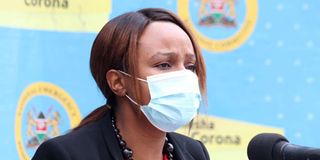Women’s voices drown in reporting of Covid-19

Health Chief Administrative Secretary Dr Mercy Mwangangi updates the media on Covid-19 cases in the country on September 22, 2020.
What you need to know:
- In Kenya, women only account for 15 per cent of the lead voices in the media.
- The concerns come at a time academia and the scientific community have come under fire for “manels” – panels that are made purely of men.
Kenyan women’s voices have been “drowned out” in the reporting of coronavirus, a recent study shows.
And every voice has been swallowed up by up to four men, according to the study funded by the Bill and Melinda Gates Foundation.
It was carried out in Kenya, Nigeria, South Africa, India, the US and the UK.
Four in five national decision makers in Kenya are men, the report that was made public on Thursday says. It analysed 11,913 publications and 1.9 million stories between March 1 and April 15.
The study looked at three indicators: Women as sources of news expertise; news stories leading with women protagonists; and coverage of gender equality issues in Covid-19 stories”.
Media are more likely to seek out politicians, who make up nearly a quarter of the people quoted (23 per cent) and overlook female experts.
In Kenya, women only account for 15 per cent of the lead voices in the media.
“This is not new. Covid-19 has shown how women are overlooked in academia, research, leadership and other fields,” African Population Health Research Centre director Catherine Kyobutungi told the Saturday Nation.
Dr Kyobutungi said when any individual is asked who a leader is, the picture in their mind is of a man or a white woman but rarely an African woman.
Reproductive health
A study published in the Harvard Business Review by Prof David Smith, a sociologist, and colleagues analysed the description of women and men.
Part of the report “The Different Words We Use to Describe Male and Female Leaders” reads: “The most commonly used positive term to describe men was ‘analytical’, while for women it was ‘compassionate’. The commonly used negative term to describe men was ‘arrogant’. For women, it was ‘inept’.”
Prof Smith said “analytical” is task-oriented, speaking to an individual’s ability to reason, interpret, strategise and lending support to the objectives or mission of the business while “compassion” is relationship-oriented, contributing to a positive work environment and culture, but perhaps of less value to accomplishing the work at hand.
The concerns come at a time academia and the scientific community have come under fire for “manels” – panels that are made purely of men.
The Kenya Obstetrical and Gynaecological Society, an association whose members are mainly women, is being trolled online for having a panel of seven with only one woman who is not African.
“We cannot purport to support women reproductive health and fail to have their critical voice heard in representation,” Dr Stella Bosire said of the photo.
Dr Kyobutungi said part of the problem is how women have been socialised to always doubt themselves.




